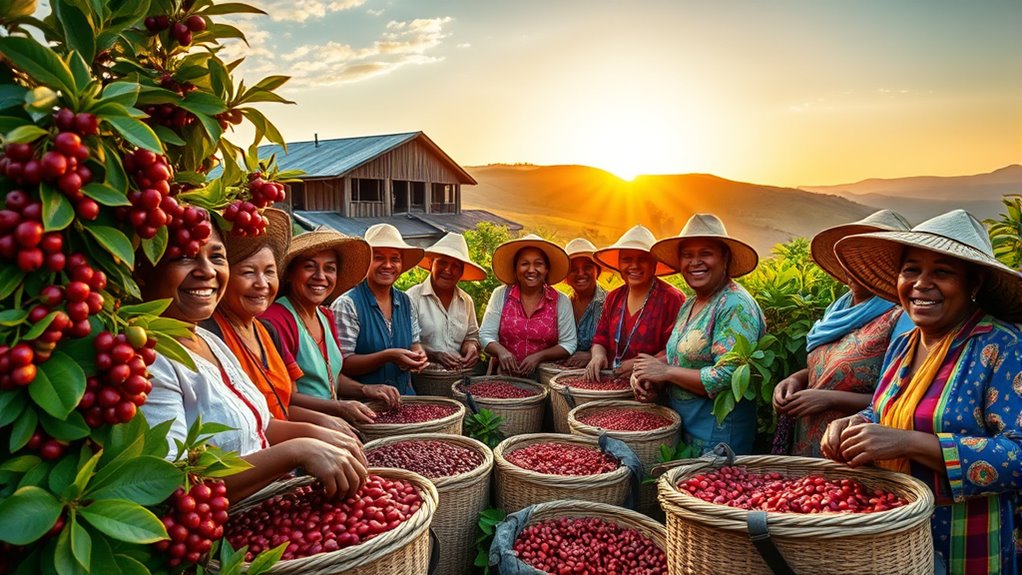Coffee cooperatives empower farmers like you by pooling resources, sharing knowledge, and negotiating better prices. They open access to premium markets through certifications and help improve coffee quality. These groups also support community projects, provide financial aid, and promote sustainable practices. With strong governance and global partnerships, they boost your market stability and social responsibility efforts. If you want to discover how these cooperatives transform farmers’ lives worldwide, keep exploring the benefits they offer.
Key Takeaways
- Coffee cooperatives enable farmers to share resources, improve quality, and access larger markets collectively.
- They provide certification assistance, opening opportunities in premium, fair trade, and organic markets.
- Cooperatives offer financial support, low-interest loans, and risk management to enhance farm stability.
- They promote sustainable practices, community development, and infrastructure improvements for long-term growth.
- By partnering globally, cooperatives strengthen farmers’ bargaining power and ensure fairer trade practices worldwide.

Have you ever wondered how smallholder coffee farmers improve their market power and sustainability? The answer often lies in coffee cooperatives—organized groups of farmers working together to strengthen their position in the global market. When you join a cooperative, you’re part of a collective that shares resources, equipment, and knowledge, making it easier to compete against larger producers. This shared approach allows you to leverage scale, negotiate better prices, and access bigger markets that would be difficult to reach alone.
Many cooperatives also provide educational support, offering training on best farming practices and insights into consumer preferences, which helps you produce higher-quality coffee that appeals to international buyers.
Cooperatives offer training to improve farming skills and meet international consumer preferences.
Being part of a cooperative can bring stability to your income. They often provide financial assistance, low-interest loans, and risk management strategies to help you weather market fluctuations or unexpected challenges like crop diseases or natural disasters. Access to equipment is another benefit—cooperatives often own processing machinery and supplies that individual farmers mightn’t afford on their own. This access enables you to improve the quality of your coffee while saving money.
Additionally, cooperatives help you navigate certification processes needed for international trade, such as organic or Fair Trade certifications, opening doors to premium markets and higher profits. Shared marketing resources within the cooperative also boost your coffee’s visibility, expanding your business opportunities.
The structure of cooperatives can vary widely. Some are small, local groups focusing on specific coffee types or regions, while others are large organizations operating nationally or even internationally. Governance models differ, with some cooperatives having centralized control, while others operate more democratically, giving members a voice in decision-making.
Many small cooperatives focus on developing unique coffee profiles, while larger ones manage significant volumes and resources. Most cooperatives operate as non-profit entities, reinvesting profits into community development, infrastructure, and member support.
Financial management within cooperatives is more effective than individual efforts. Members typically pay fees that are pooled to fund community projects, buy equipment, or provide loans. These collective funds help secure the community’s financial stability and safeguard against market volatility.
The cooperative’s resources support local infrastructure, like roads or processing facilities, which benefits everyone. Many also offer low-interest loans for farm improvements or emergencies, ensuring you have the financial backing you need to maintain or expand your farm.
On a global scale, cooperatives have a significant impact. Over 30% of Colombia’s coffee is sold through cooperatives, and their partnerships with international roasters and traders help secure better deals. They play an essential role in the specialty coffee industry and promote fair trade practices, advocating for fair prices and sustainable farming.
Furthermore, the success of coffee cooperatives often depends on strong leadership and organization, which can determine their ability to adapt and thrive in competitive markets.
By managing risk and providing a steady supply, cooperatives contribute to market stability. They also champion sustainable practices, encouraging environmentally friendly farming, social responsibility, and certification efforts that protect both the environment and farmers’ communities.
Joining a cooperative empowers you to improve your livelihood while supporting a more sustainable, equitable coffee industry worldwide.
Frequently Asked Questions
How Do Coffee Cooperatives Impact Local Economies Beyond Farming?
You see, coffee cooperatives boost local economies by investing in community projects like infrastructure, schools, and healthcare, which creates jobs and improves living standards.
They attract tourism through agritourism and support small businesses by purchasing local supplies. This collective effort stimulates economic growth, empowering residents beyond farming.
What Are the Main Challenges Cooperatives Face in Global Markets?
You face many challenges in global markets, from price volatility that threatens your income to rising input costs and market instability.
Limited resources and technology hinder your ability to compete, while climate change and pests threaten your yields.
Negotiation skills and fair profit distribution are tough, and meeting sustainability standards adds pressure.
Competition and governance issues further complicate your efforts, making it essential to build capacity and adapt to changing market demands.
How Can Consumers Support Coffee Cooperatives Directly?
Imagine your next coffee purchase as a powerful wave that lifts farmers from hardship to hope. You can support cooperatives directly by choosing Fair Trade or direct trade coffee, ensuring more money reaches farmers.
Visit farms, join community events, or volunteer. Buying organic, eco-friendly coffee or participating in cooperative programs amplifies your impact.
Every sip becomes a stand for sustainable farming, fairness, and a brighter future for farmers worldwide.
What Training or Resources Do Cooperatives Provide to Farmers?
You might wonder what training or resources cooperatives offer to farmers. They provide education on sustainable practices, like low-input farming and nursery management, to improve quality and reduce costs.
They also offer financial management guidance, access to markets, and quality enhancement support from local experts.
Additionally, cooperatives help build strong structures, partner with NGOs, and empower women, ensuring farmers grow better coffee while benefiting from long-term sustainability and higher earnings.
How Do Cooperatives Ensure Fair Profit Distribution Among Members?
Imagine a circle where every voice matters, and profits are shared fairly among all. You see, cooperatives guarantee this by using democratic decision-making, where each member votes and benefits from transparent processes.
They distribute earnings based on contributions, passing premiums directly to farmers. This fair system builds trust, lifts incomes, and creates a balanced community where everyone shares in success, fostering hope and sustainability.
Conclusion
By joining coffee cooperatives, you become part of a thriving ecosystem that uplifts farmers and strengthens communities. Just like a well-tended garden blooms with diverse life, cooperatives nurture growth, resilience, and shared success. When you support these networks, you’re planting seeds of change that can blossom into sustainable futures. Your involvement transforms individual efforts into a mighty forest, where each tree’s strength supports the whole. Together, you cultivate a future rooted in hope and empowerment.









